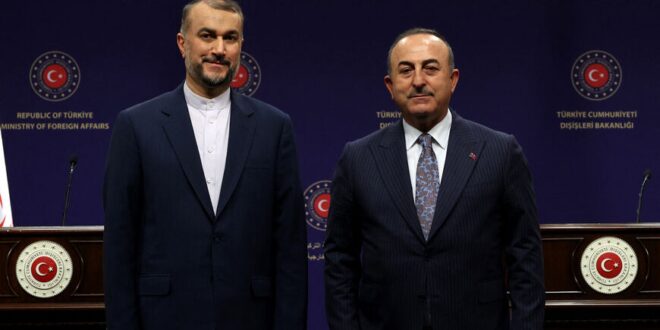The top Iranian and Turkish diplomats are also expected to discuss the Syrian, Nagorno-Karabakh and bilateral files during their meeting.
The Turkish Foreign Ministry announced Tuesday that Iranian Foreign Minister Hossein Amir-Abdollahian would pay a visit to Turkey in solidarity after the twin earthquakes.
Amir-Abdollahian, who will travel to Turkey on Wednesday, is expected to meet with his Turkish counterpart, Mevlut Cavusoglu, in Ankara and then travel to Adiyaman, one of the provinces hardest hit by the Feb. 6 killer earthquakes, the official statement said.
Turkey’s southeastern neighbor was one of the first countries to dispatch humanitarian aid and rescue workers to the country after the temblors killed more than 46,100 people.
During their meeting in Ankara, the two top diplomats are also expected to discuss bilateral and regional issues including ongoing Russian-led efforts to hold a fresh round of high-level talks between Ankara and Damascus.
Speaking on Monday, Russian Deputy Foreign Minister Mikhail Bogdanov said efforts were underway to gather Syrian and Turkish foreign ministers together as part of the high-level political dialogue that was launched late last year. The Iranian foreign minister is also expected to join the talks.
“We are working on this,” Bogdanov was quoted as saying by Russia’s state-run Tass. He added, “I can only say that we have agreed not to disclose details — it is a guarantee of successful work until the time is ripe. … We should be working discretely and on the principles of quiet diplomacy.”
The first round of high-level political talks between the Turkish and Syrian governments was held in Moscow in December between the Russian, Turkish and Syrian defense ministers and intelligence chiefs. The contact marked the first of its kind after more than a decade of hostilities between Ankara and Damascus. Iran, which also extended its support for the talks, became involved in the process later on.
Moscow and Tehran have been the major supporters of Damascus. Ankara, which severed its diplomatic ties with Damascus in 2012, meanwhile backs Sunni Syrian rebels fighting against Syrian President Bashar al-Assad’s government and controls vast areas in the war-torn country’s north in cooperation with armed Syrian opposition groups.
The Ankara-Damascus thaw, which marks a major U-turn in Turkey’s foreign policy, focuses on the refugee issues as well as efforts to end the Syrian civil war and combat terrorism, the Turkish government says. Turkey considers US-backed Syrian Kurdish groups “terrorists” and launched several military operations to crush the Kurdish-led self-rule in northeast Syria.
Potential cooperation between Ankara and Damascus can facilitate the withdrawal of the Kurdish groups from northern Syrian regions. It can also alleviate the pressure on the Turkish government over some 4 million Syrian refugees living in Turkey where anti-refugee sentiments run high. These, in turn, can strengthen the Turkish government’s hand ahead of the crucial May 14 elections, as Turkey’s President Recep Tayyip Erdogan faces one of his most challenging election bids in more than two decades.
Amir-Abdollahian and Cavusoglu are also expected to discuss the rising tensions between Azerbaijan and Armenia over the contested Nagorno-Karabakh region.
Backed by the Turkish army, Azeri troops seized control of a large chunk of territories in the contested region in the southern Caucasus during a war in 2020 between Azerbaijan and Armenia. Ankara and Baku now eye to set up a land corridor linking Turkey’s easternmost border to Azerbaijan through Azeri exclave Nakhchivan via Armenian territory. Yet Tehran remains staunchly opposed to the so-called Zangezour corridor plan, as it will mean the rupture of the land connection between Armenia and Iran. Tensions between Azerbaijan and Iran, which supports Armenia, are also on the rise following an attack on the Azeri Embassy in Tehran in January that killed a member of the Azeri diplomatic mission.
In addition to the regional files, the Iranian and Turkish foreign ministers are also expected to discuss Iranian President Ebrahim Raisi’s planned visit to Turkey. Speaking during his previous visit to Ankara in January, Amir-Abdollahian said the two capitals had begun working on preparations for the visit during which they are expected to hold a new round of the High-Level Strategic Cooperation Council meetings.
 Eurasia Press & News
Eurasia Press & News




